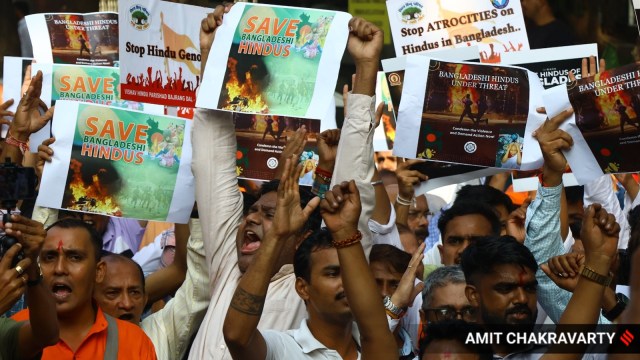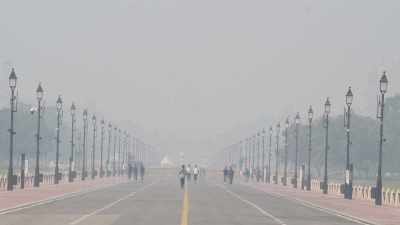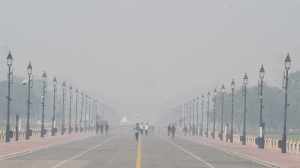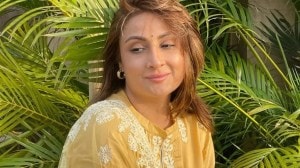Stay updated with the latest - Click here to follow us on Instagram
Arrest of a Hindu monk and the minority question: What’s happening in Bangladesh?
The arrest of Chinmoy Krishna Das in Bangladesh has led to protests in India and added to the strained ties between New Delhi and Dhaka. Here’s all you need to know.
 Members of Vishwa Hindu Parishad (VHP) shout slogans as they are stopped by police during a protest outside the Bangladesh High Commission in Mumbai on Monday. (Express Photo by Amit Chakravarty)
Members of Vishwa Hindu Parishad (VHP) shout slogans as they are stopped by police during a protest outside the Bangladesh High Commission in Mumbai on Monday. (Express Photo by Amit Chakravarty)Questions over the safety of minorities, particularly Hindus, in Bangladesh were raised shortly after the fall of the Sheikh Hasina government in August. The recent arrest of a Hindu monk in the neighbouring country has once again brought these concerns to the fore.
Chinmoy Krishna Das has been arrested on sedition charges. His bail hearing was set for Tuesday. However, due to the lack of a lawyer to represent him, the court has adjourned the hearing to January 2, 2025. The International Society for Krishna Consciousness (ISKCON) has claimed that the lawyer representing Das was brutally attacked by “Islamists”.
His arrest has led to protests by Hindu outfits in India, demanding his release. One such protest outside the Bangladesh Assistant High Commission at Agartala, Tripura, against Das’s arrest turned violent on Monday. A group of protesters under the aegis of the Hindu Sangarsh Samiti broke police barriers and indulged in vandalism inside the High Commission, also removing Bangladesh’s national flag from its pole.
While the Ministry of External Affairs deemed the act “deeply regrettable”, its Bangladeshi counterpart urged immediate action, reminding New Delhi of the Vienna Convention on diplomatic relations.
Who is Chinmoy Krishna Das and why was he arrested?
Das was once associated with ISKCON in Bangladesh. The organisation has claimed he was expelled in September for violating its rules. He is also the spokesperson of the Bangladesh Sammilit Sanatan Jagran Jote.
He had been leading rallies demanding security for Hindus. The Sammilit Sanatan Jagran Jote has been asking for the implementation of an eight-point list of demands, which include instituting a minority protection law, a minister for minority affairs and a special tribunal for acting swiftly on cases of minority persecution, among others.
Das was arrested in Dhaka’s main airport on November 25 while travelling to Chattogram in southeastern Bangladesh.
At a United Nations forum, Bangladesh for its part asserted that the arrest of the Hindu leader had been “misconstrued”. “… He was actually arrested on specific charges. The matter is being dealt with by our court of law,” said Tareq Md Ariful Islam, ambassador and permanent representative of Bangladesh to the UN and other international organisations in Geneva.
“We expect that these processes will deal with the case in a just, fair, and transparent manner, ensuring full respect for the legal rights of all concerned,” Ministry of External Affairs Spokesperson Randhir Jaiswal said on November 29.
UK Parliamentarians highlight arrest of Hindu monk
Parliamentarians in the United Kingdom have also raised concerns over Das’s arrest. Conservative MP Priti Patel highlighted the spread of violence in Bangladesh in the House of Commons and also demanded to know what is being done to secure the release of the religious leader.
Labour MP Barry Gardiner underlined instances of attacks on Hindu temples and the arrest of the Hindu monk. “The situation is clearly on a knife edge,” he said.
I am deeply concerned by the awful violence we have seen in Bangladesh, and my thoughts are with those affected.
In Parliament this afternoon, I called on the Government to set out how they are engaging with the Bangladeshi Government on this pressing and important issue.… pic.twitter.com/jRXciBQIKH
— Priti Patel MP (@pritipatel) December 2, 2024
Responding to their queries, the parliamentary under-secretary of state for foreign affairs, Catherine West, said, “I was given assurances by the interim Government in Bangladesh that support was available for minority communities in Bangladesh in the lead up to Durga Puja—a national festival.”
“The UK Government will continue to monitor the situation… and will engage with the interim Government in Bangladesh on the importance of freedom of religion or belief specifically as it affects the Hindu community,” West added.
TMC urges Centre to reach out to the UN
The Trinamool Congress on Tuesday brought up the issue in Parliament. During the Zero Hour in the Lok Sabha, TMC leader Sudip Bandyopadhyay said that West Bengal was directly affected by the happenings in neighbouring Bangladesh. Noting that minorities, including Hindus, are being “tortured and killed” in Bangladesh, Bandyopadhyay urged the Centre to appeal to the UN to send peacekeeping forces to the country.
Earlier, West Bengal Chief Minister and TMC supremo Mamata Banerjee had made a similar appeal while speaking in the State Assembly.
Growing distance between India and Bangladesh
Criticising Indian authorities for lapses that led to the violence in Agartala, the law affairs adviser in Bangladesh’s interim government, Asif Nazrul, said that India needs to realise that “this is not Sheikh Hasina’s Bangladesh”.
Ties between New Delhi and Dhaka have remained strained since the ouster of Hasina, who went on to seek asylum in India. In September, Mohammed Yunus, chief advisor to the interim government, had said that relations between India and Bangladesh were at “a low”. Bangladesh has also said that it will seek Hasina’s extradition from India and hold her accountable for the hundreds of deaths during the student-led protests that ended her 15-year rule.
Among the factors behind the deteriorating ties between the neighbouring countries have been reports of attacks on minorities. As The Indian Express reported earlier, at least 205 incidents of attacks on members of the Hindu community were recorded in the two weeks after the fall of the Hasina government.
Randhir Jaiswal during a presser last week reiterated that the Indian Government has consistently raised the issue of threats and “targeted attacks” on Hindus and other minorities with the Bangladeshi authorities. “Our position on the matter is clear—the interim government must live up to its responsibility of protecting all minorities,” the MEA spokesperson added.





- 01
- 02
- 03
- 04
- 05


























